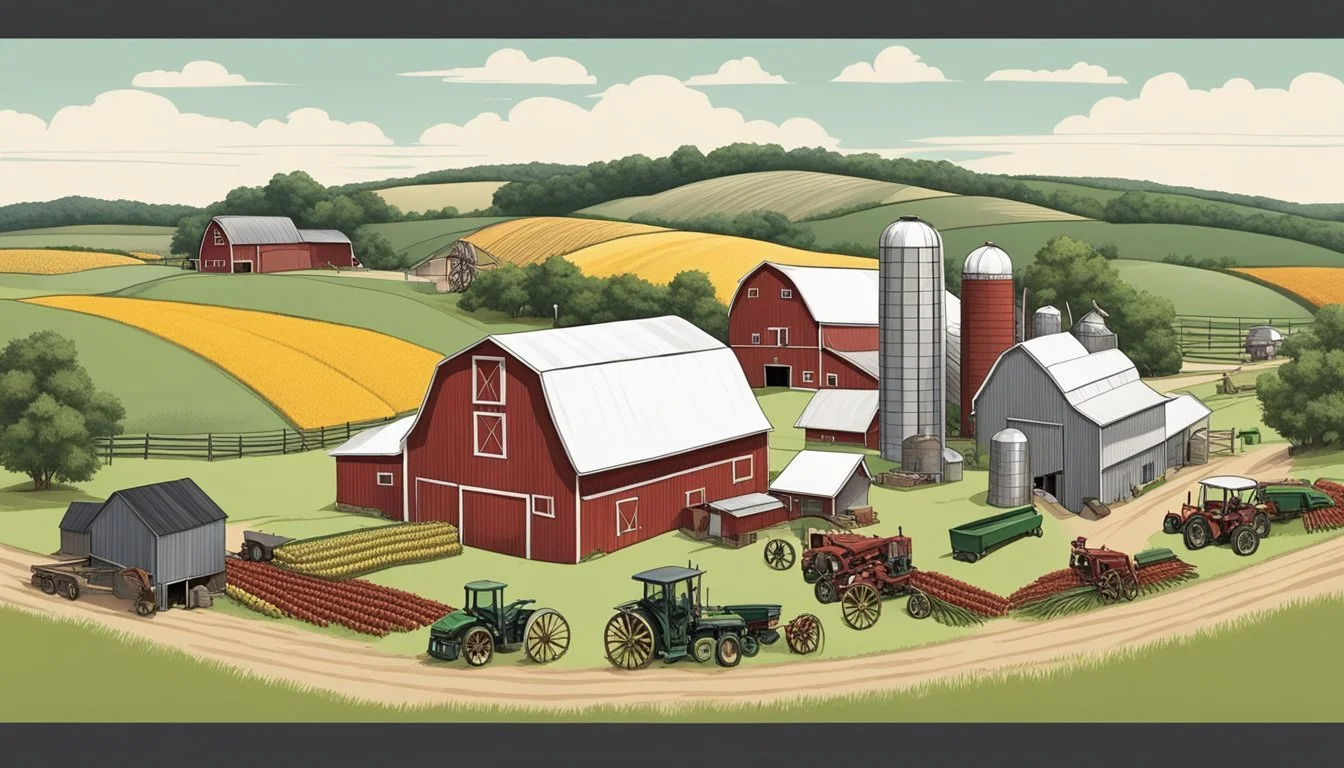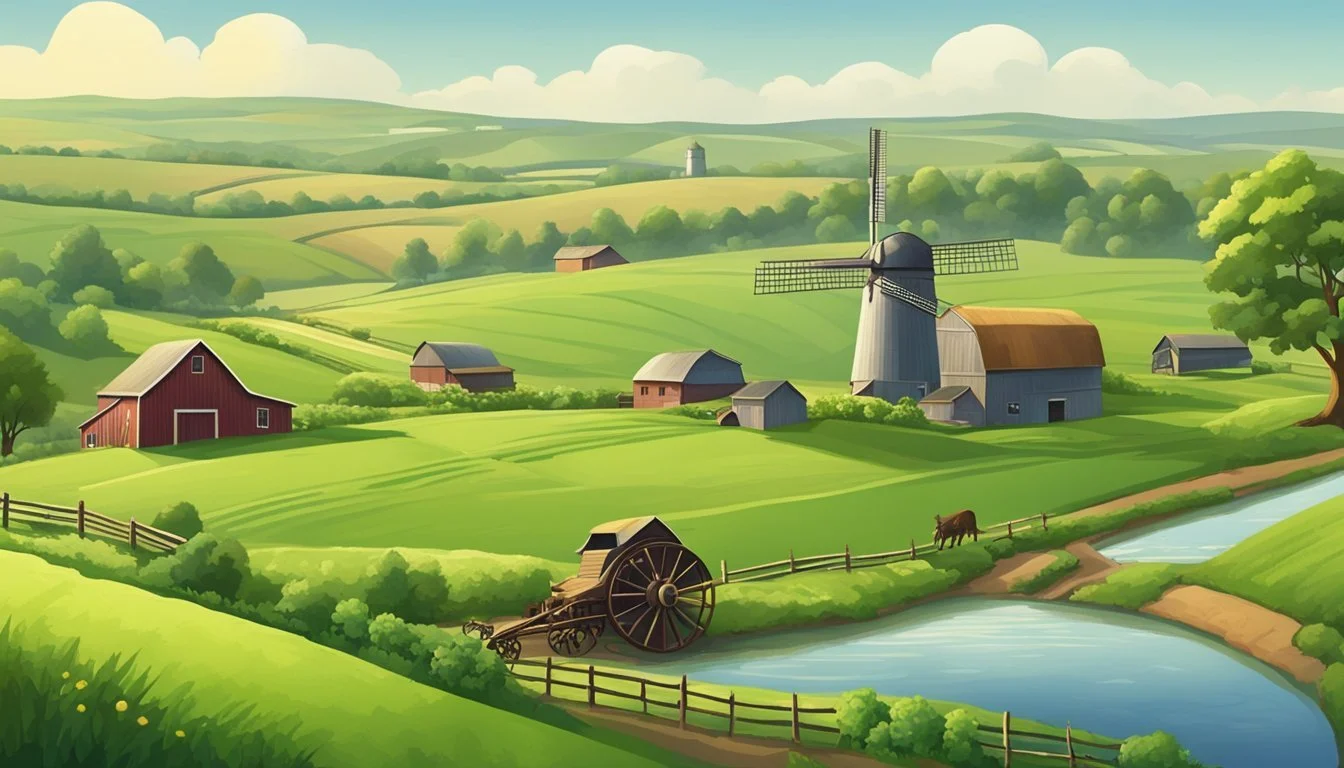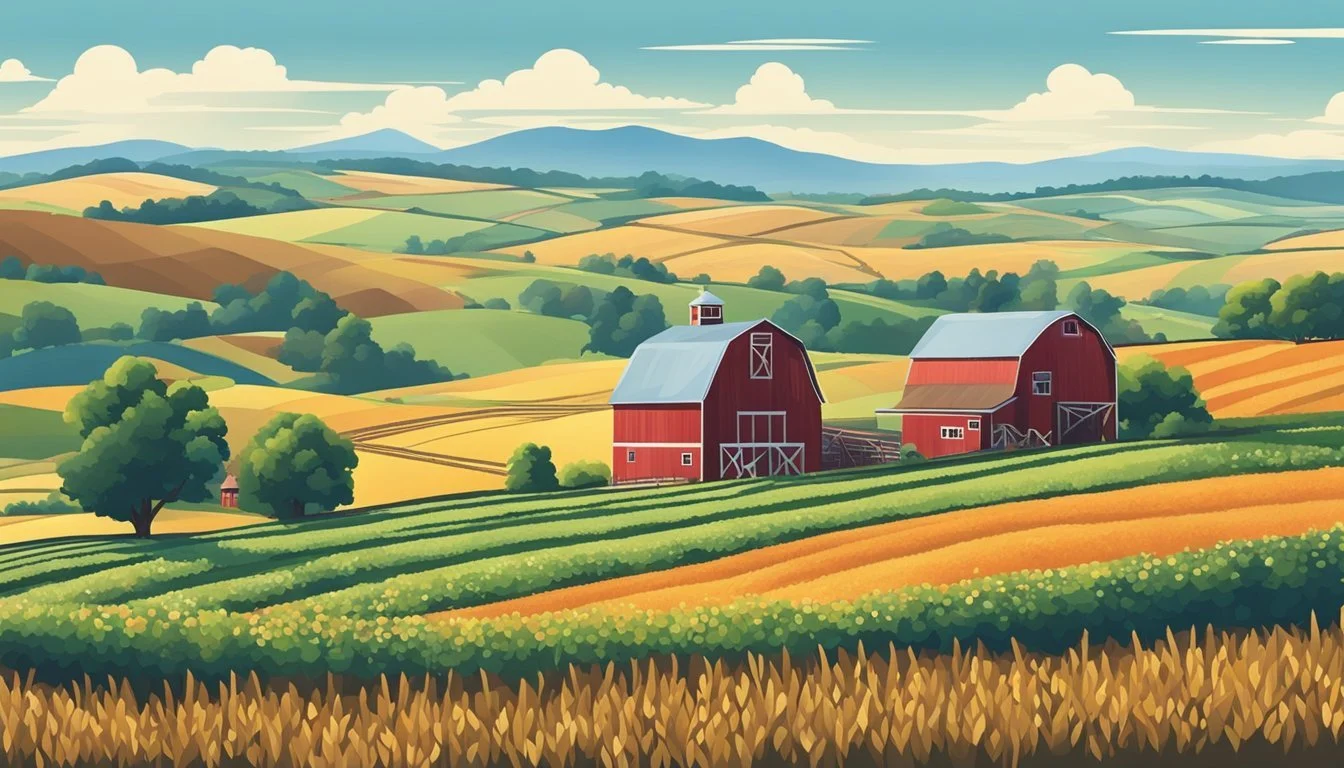Historical Farms and Agricultural Museums in Iowa
Exploring Heartland Heritage
Iowa's rich agricultural heritage is showcased in a variety of historical farms and agricultural museums across the state. These institutions serve as gateways to the past, offering tangible insights into the evolution of farming practices and rural life. Visitors can find a unique blend of education and nostalgia, as they explore preserved farm structures, vintage machinery, and collections that represent various eras of the agricultural industry.
Among the gems is Living History Farms in Urbandale, Iowa, an interactive outdoor museum that illustrates the transformation of the Midwest's fertile prairies over 300 years. Here, one can travel through time, from a Native American Ioway Farm to a bustling 1900 Horse-Powered Farm, all while absorbing the pioneering spirit that shaped today's farming landscape. Besides this, Iowa's reverence for agricultural history is evidenced by other establishments, such as the Henry A. Wallace Country Life Center, revealing 40 acres of the original Wallace family farm, and an impressive assembly of Allis Chalmers tractors at a dedicated museum.
These sites not only celebrate Iowa's agricultural milestones but also offer an educational resource to understand the challenges and innovations that have defined rural American life. They embody the state's ongoing commitment to preserving and sharing its agrarian roots with future generations. Through interactive experiences, personalized tours, and well-preserved artifacts, they keep the story of Iowa's farmland vibrant and accessible.
History of Agriculture in Iowa
Iowa’s agricultural heritage is a tapestry woven through time, showcasing the state's evolution from the land of the pioneers to a leader in modern farming practices. The progress of farm development alongside the settlement stories provides a glimpse into the remarkable transformation of Iowa’s landscape.
Development of Iowa Farms
Iowa's rise as an agricultural powerhouse began with its rich, fertile soil, making it an ideal location for cultivating crops like corn and wheat. Throughout history, successive technological and methodological advancements transformed the state's farming operations into more efficient ventures. During the 19th century, the introduction of railroads boosted the regional economy by opening up new markets for Iowa's agricultural products.
Pioneer Farming and Settlement
The settlement of Iowa by pioneers was integral to the Midwest's expansion during the westward movement of the United States. They developed diverse farming operations, raising cattle and producing hay, which became staples of the state's economy. The initial farming ways were labor-intensive, reshaping the vast prairies into productive farmland that laid the foundation for future agricultural success.
Key Agricultural Museums and Living History Farms
Iowa's landscape is rich with museums and farms dedicated to preserving and showcasing its deep agricultural roots. Visitors gain hands-on experience and insight into the state's farming evolution through engaging, interactive exhibits and activities.
Living History Farms in Urbandale
Living History Farms in Urbandale offers a unique outdoor museum experience, showcasing over 300 years of Iowa's agricultural history. Visitors to Urbandale, Iowa, are invited to explore this 500-acre site featuring authentic recreations of historical farms, a 1876 Town of Walnut Hill, and a wealth of agricultural artifacts. Here, one can witness firsthand the transformation of Midwest prairie into bountiful farmland.
National Farm Toy Museum in Dyersville
The National Farm Toy Museum, located in Dyersville, Iowa, is a specialized museum that immortalizes the importance of farm toys in American culture. Collectors and enthusiasts can admire an extensive collection of detailed models and replicas of tractors and farming machinery, which together tell a tale of agricultural progression and innovation.
Heartland Acres Agribition Center in Independence
Heartland Acres Agribition Center, situated in Independence, Iowa, is an agricultural museum that focuses on the past, present, and future of farming. The Agribition Center displays an impressive array of historical and modern machinery, offering visitors an extensive look into the technological advances in agriculture and its impacts on farming life.
Historical Farms and Structures
Iowa's commitment to preserving its agricultural legacy can be vividly experienced through meticulously preserved historical farms and structures. Visitors can stroll through the living past and witness the evolution of farming and rural life.
The 1700 Ioway Farm
The 1700 Ioway Farm represents the lives of the Ioway people, who were among the earliest inhabitants of Iowa. Visitors can explore a historically-accurate replica of an Ioway farm, complete with traditional homes like the bark-covered house and a corn processing area, demonstrating the resourceful farming techniques used by the Ioway tribe.
The Flynn Mansion and Barn
The Flynn Mansion, an elegant Victorian home, was owned by Martin Flynn, an Irish immigrant who became a prominent Iowan businessman. The mansion, alongside the adjacent barn, reflects the prosperity of some 19th-century Iowan farmers and contrasts with the simpler structures of earlier periods.
Schoolhouse and General Store
Immersive experiences continue at the replicated 1875 town of Walnut Hill, featuring an authentically reconstructed schoolhouse that offers a glimpse into the education system of the era. The bustling general store nearby serves as a testament to Iowa's expanding economy during this period, showcasing an array of goods available to Iowans of the time.
Farming Practices and Agricultural Heritage
Iowa's farming practices and agricultural heritage chronicle the evolution from draft-horse plowing through to state-of-the-art mechanized assistance. Honoring traditions while embracing innovation, Iowa remains a testament to the steadfastness of its farming operations.
Crop Cultivation Techniques
In Iowa, corn and wheat are staple crops, cultivated with a mixture of age-old wisdom and modern farming techniques. Crop rotation and conservation tillage play significant roles in maintaining soil health and productivity. These practices, perfected over generations, reflect Iowa's commitment to sustainable agriculture.
Livestock and Dairy Farming
Dairy farming and cattle rearing are other pillars of Iowa's agricultural forte. Quality hay is an essential component, used both for feed and soil conservation. Dairy farms in Iowa prioritize animal health and high-quality milk production, often integrating advanced dairy management systems.
Preservation of Farming Implements and Machinery
Iowa takes pride in preserving its agricultural heritage, especially the farming implements and machinery that have shaped its landscape. Museums and historical farms showcase collections of vintage tractors, plows, and other implements. Restoration of such machinery, including those powered by draft horses, offers a tangible connection to the past.
Visitor Experience
When visiting historical farms and agricultural museums in Iowa, guests can expect a rich tapestry of engaging experiences. They have the opportunity to immerse themselves in the Midwestern agrarian lifestyle through hands-on activities and learning from experts in the field.
Interactive Tours and Activities
Living History Farms invites visitors to actively participate in the rural way of life. One can enjoy traveling through time across three working farm sites: the 1700 Ioway Farm, the 1850 Pioneer Farm, and the 1900 Horse-Powered Farm, each offering a distinct glimpse into Iowa’s agricultural evolution. Guests engage with various interactive tours where they can perform tasks reminiscent of historical farm life.
1700 Ioway Farm: Observe indigenous farming techniques.
1850 Pioneer Farm: Experience the life of early settlers.
1900 Horse-Powered Farm: Discover the impact of the first machines in agriculture.
Living History Farms' interactive outdoor history museum enables visitors to learn through doing, connecting them directly to Iowa's rural past.
Cultural and Historical Interpretation
Museums like the National Farm Toy Museum enrich the visitor experience by providing cultural and historical contexts through vast exhibitions of farm toys and memorabilia. These items are not just playthings but are representations of the agricultural development over time. Trained interpreters are on hand to explain the significance of different eras represented within the exhibitions.
Events and Educational Programs
Educational programs and events are fundamental components of the visitor experience. Historical farms in Iowa host seasonal activities tailored to educate various age groups about agricultural heritage. Living History Farms for instance, showcases demonstrations and events that allow people to experience history outside of a textbook.
Spring Planting: Witness the traditional planting methods.
Harvest Festival: Take part in harvest celebrations and demonstrations.
Educational Workshops: Attend workshops designed for learners of all ages.
Living History Farms' events and programs exemplify their investment in fostering an understanding and appreciation for Iowa's agricultural history.
Practical Information for Visitors
Visiting historical farms and agricultural museums in Iowa provides a unique perspective into the state's rich agricultural past. These destinations offer educational experiences that are both immersive and informative.
Opening Hours and Admission Costs
Living History Farms:
Hours: Monday – Saturday, 9:00 AM – 4:00 PM
Cost: Adults $16, Children (2-12) $9.50, Seniors (60+) $14 Prices are subject to change, please check Living History Farms for current admission rates.
Agricultural Museums:
Hours: Vary by location, typically 10:00 AM – 3:00 PM
Cost: Many museums have free admission but may request donations. Specific costs can be found on each museum's official website via Visit Iowa Farms.
Facilities and Accessibility
Living History Farms provides:
Accessibility: Most buildings and restrooms are wheelchair accessible.
Facilities: Dining options on-site, picnic areas, and modern restrooms.
Agricultural Museums generally offer:
Accessibility: Accessibility varies by location; please confirm with specific sites.
Facilities: Rest areas and basic amenities, more details are available via official websites.
Directions and Parking Information
Living History Farms is located in Urbandale, Iowa. Parking is ample and free for visitors.
For Agricultural Museums, location-specific directions should be obtained from the respective websites. Parking is typically available on-site with varying costs and availability. It is advisable to review parking information on the museums’ individual websites to ensure convenience upon arrival.




